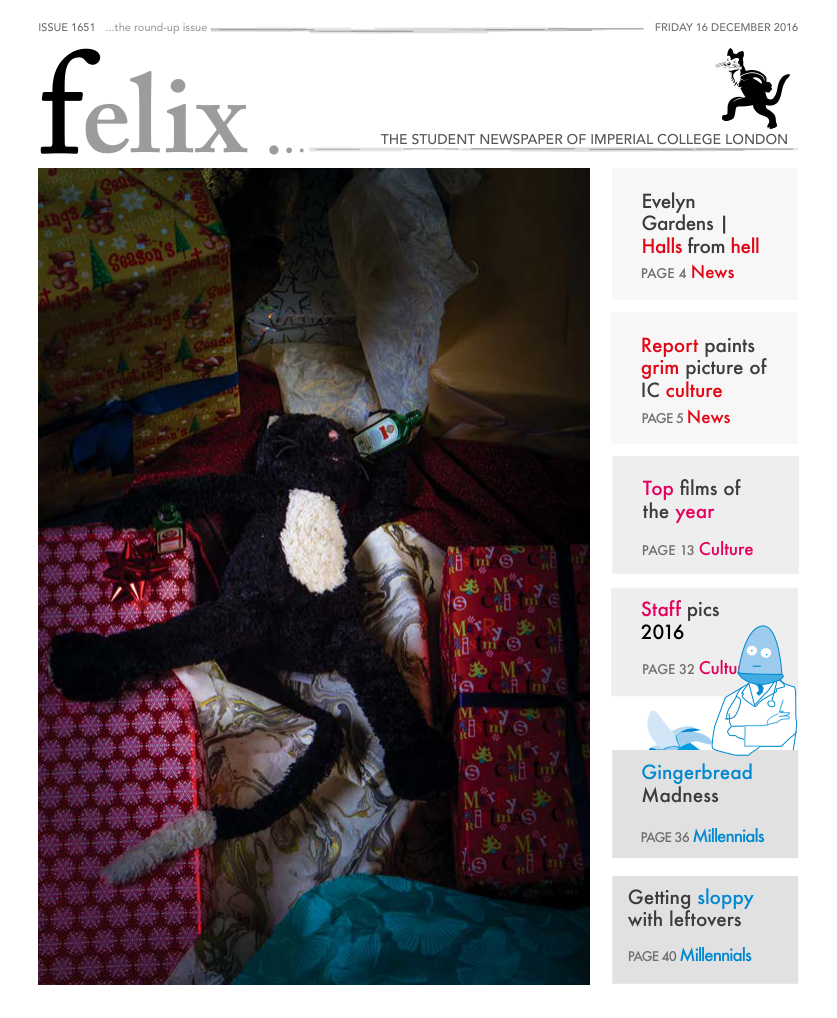Report sheds light on Imperial culture
And the picture ain’t pretty

Results of a report investigating Imperial’s institutional culture were recently released to the public, revealing a troubling picture behind the shining facade of academic excellence. The report was commissioned after felix brought to the public’s attention a series of incidents that took place during Varsity 2015, which saw the sexist mistreatment of Women’s Rugby. The report aimed at shedding some light on Imperial’s institutional culture. This encompasses habits and behaviours that might include student work ethics and study behaviours but also our core beliefs, which are expressed through our relationship with excellence. Of particular interest were the impacts of this culture on gender equality so as to propose a workframe for tackling institutional sexism, which is commendable considering the potential damage any findings could do.
Indeed, at the very start of the report, it reads “the Provost’s Board recognised that some of the project findings might not show the College in its best light but the opportunity for the organisation, and the wider sector, to learn and respond to the research was considered more important than any natural concern about potential negative publicity”.
And certainly, the findings don’t paint a flattering picture of Imperial: a picture of pressure, ‘elite’ white masculinity, silence and tokenism.
The main pillar of the College’s culture is excellence. It’s part of the brand. The first line of the introduction at Imperial’s website reads “Imperial College London is a science-based university with an international reputation for excellence in teaching and research.” Yet, this obsession with excellence breeds competition rather than collaboration and creates an environment where the inability to cope with the pressures and stress of academia is perceived as a weakness instead of a problem in need of support.
Theresa Davey, a materials PhD student who has spent almost a decade at Imperial College agrees: “Imperial does produce excellent work but it’s at the expense of mental health and happiness of the people here”
Issues such as students concealing their vulnerabilities from their peers, experiencing bullying in work and study hierarchies, and even the lack of community spaces are all noted in the report. On an undergraduate level these pressures may be remedied through participation in social activities within College’s hundreds of student led clubs and societies. “This is definitely a space that has helped a lot of people through break ups, mental health issues, suicide attempts,” says Ksenia Solovieva, a physics undergraduate currently between her first and second year, referring to the safe haven that the Sci-fi and Fantasy library is for many students. “I’m not good friends with anyone from my year, all my friends have come through societies” When asked why, the answer is simple: “It’s not competitive here. [In your department] you compare yourself to your peers ‘cause you might be working on the same problem but they’re five steps ahead and you realise you’re not that great”
For postgraduates and staff, opportunities for healthy socialising outside the work environment might be even fewer and the pressures even more real. The degree of participation in society events and union campaigns plummets as soon as the transition is made from the undergraduate to the postgraduate or staff level.
“Through the Graduate School, College provides funds for cohort building amongst postgraduates, however, these resources are very underused and few people know about them”, says Davey.
On top of that, there is widespread misogyny and homophobia, the effects of which are augmented by the highly pressurised environment. According to one of the testimonials cited in the report, “the ‘ingrained misogyny’ at Imperial was so deep that it had become normal”. The event that sparked the investigation is only the tip of the iceberg. Earlier in October, an entire campaign was launched, aiming at promoting sport amongst Imperial’s female population only to land flat on its face after being criticised for the sexist undertones of events which called at participants to “burn the calories away”.
Even prestigious initiatives such as the Athena SWAN scheme were criticised in the report as failing to effectively target gender inequality, with participants accusing the scheme of having “scratched the surface of issues” or “providing a veneer which concealed continuing inequalities” Following the publication of the report, Imperial’s Provost, Professor James Stirling said that, “if only a single person within our community experiences harassment, or is unable to access the support they need – that is one person too many. These findings remind us that we cannot stand still. We must do better.”
We also approached Deputy President for Welfare, Emily Jane Cramphorn who said: “The overwhelming outcome from the report is the ruthless competition and extreme pressures that our community faces.
“It finally verbalises what so many of us experience which I hope will encourage the College to address these problems.
“However, I would like to have seen issues surrounding diversity, prejudice and feeling silenced covered in more depth.”
The report suggests a number of recommendation that could help improve the Culture at Imperial. These include, appointing a Vice-Provost for Student and Staff Equality and wellbeing, creating a Centre for Emotional Excellence, housing welfare and wellbeing services and providing a venue for training around skills such as emotional intelligence and self-development courses and even adding student and staff representatives to the permanent membership of the Provost’s Board.
“I think it’s really brave that College would commission and publish something that qualitatively shows these issues and that they’re committing to fix it” says Davey.
Whether College will act upon these recommendations remains to be seen.








